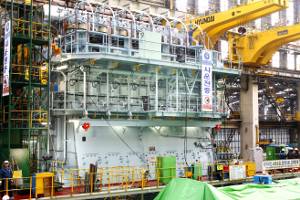
Wärtsilä reports sales success with its newly introduced Wärtsilä RT-flex82T low-speed engine. Orders for a total of 30 seven-cylinder Wärtsilä RT-flex82T engines have been received in recent months, including:
- Six engines for VLCCs to be built by Dalian Shipbuilding Industry Co.
- Six engines for VLCCs to be built by Shanghai Waigaoqiao Shipbuilding Co Ltd
- Two engines for VLCCs to be built by Hyundai Heavy Industries Co.Ltd.
- Sixteen engines for very large ore carriers to be built by Jiangsu Rongsheng Heavy Industries Co Ltd
The engines have been contracted by the licensees of Wärtsilä Corporation. Wärtsilä enjoys a global market share of approximately 50 percent in electronically-controlled low-speed engines. During the past two years, orders for 140 of the company's 82-cm bore marine engines have been placed. Of these, some 120 are for the RT-flex common-rail version.
Testing programme successfully completed
The new 82 cm bore, Wärtsilä RT-flex82T low-speed marine engine successfully completed the type approval test carried out at Hyundai Heavy Industries (HHI) in Korea. This test was carried out in the presence of representatives from the major classification societies. The first engine was installed in a Very Large Crude Carrier (VLCC) built by HHI. The tested 7-cylinder RT-flex82T has a maximum continuous power of 31,640 kW at 76 rpm.
The Wärtsilä RT-flex82T is an electronically controlled engine for large tankers, namely VLCCs and ULCCs, as well as for very large bulk carriers of between 200,000 and 400,000 dwt. The Wärtsilä RT-flex82T, being a low rpm engine, is also an attractive alternative to the higher rpm engines normally used in container ships. The lower rotational frequency offers fuel cost savings that are attractive in projects where fuel efficiency is high on the agenda.
Wärtsilä offers four 82-cm bore engine types
The four 82-cm bore engine types in Wärtsilä's portfolio, the RT-flex82C, RTA82C, RT-flex82T and RTA82T, are designed to offer the same economic and environmental benefits to different vessel types, according to their operating requirements. The programme was first introduced in November 2005, and all versions are based upon a common platform with as many parts as possible being shared. This enables benefits of rationalisation in design and manufacturing, optimized manufacturability, and spare part stocks, to be realised.
RT-flex common-rail technology
The Wärtsilä RT-flex engines feature common-rail technology. This technology offers greater parameters for propulsion plants with optimum cost efficiencies for large tankers and very large bulk carriers. In the currently challenging marine market conditions, such efficiencies are seen as offering notable economic and environmental benefits to ship owners and operators.
The complete flexibility in engine setting that is an integral feature of the RT-flex common-rail system, includes optimized fuel injection pressures and timing for all loads. It is employed in special tuning regimes to optimize brake specific fuel consumption (BSFC). The concept has now been extended to Low-Load Tuning, which provides the lowest possible BSFC in certain operating engine loads. This not only allows fuel cost savings, but also enables lower exhaust emissions of CO2.
(www.wartsila.com)



